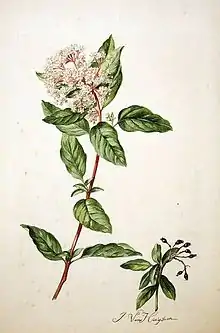Jacob van Huysum
Jacob van Huysum (1688 – 1740) was an 18th-century botanical painter from the Northern Netherlands.


Van Huysum was baptized 25 February 1688 in Amsterdam.[1] Both his father Justus van Huysum (1659–1716), and his brother Jan van Huysum (1682–1749), were celebrated flower painters. His manner of painting was very like that of his brother. His approach to botanical illustration, while preserving botanical accuracy, captured a more painterly aspect of his subject. This contrasts with the meticulously exact mode of Georg Dionysius Ehret, his contemporary colleague.
Jacob arrived in England in about 1721, and for a while lived in the house of his patron, Mr. Lockyear of South Sea House. Later he enjoyed the patronage of Sir Robert Walpole, who befriended him, and commissioned him to paint decorative works for his house at Houghton in Norfolk. More importantly he produced most of the 50 illustrations for John Martyn's Historia Plantarum Rariorum (London: 1728-38), and all the drawings for Catalogus Plantarum, an index of trees, shrubs, plants and flowers (London: 1730). His pupil was Louis Fabritius Dubourg.[1]
Historia Plantarum Rariorum depicted plants from the Chelsea Physic Garden and the Cambridge Botanic Garden. These plants had come from the Cape of Good Hope, North America, the West Indies, and Mexico. Elisha Kirkall produced the mezzotint engravings. Each plate was dedicated to a patron and showed an engraved coat-of-arms or monogram. Besides van Huysum, other artists were William Houstoun, Massey, G. Sartorys, and R. Sartorius. The work was published in five parts of ten plates each between 1728 and 1737, and was sold by subscription. The venture was not a financial success and publication ceased in 1737.
| Wikimedia Commons has media related to Jacob van Huysum. |
References
- Jacob van Huysum in the RKD
